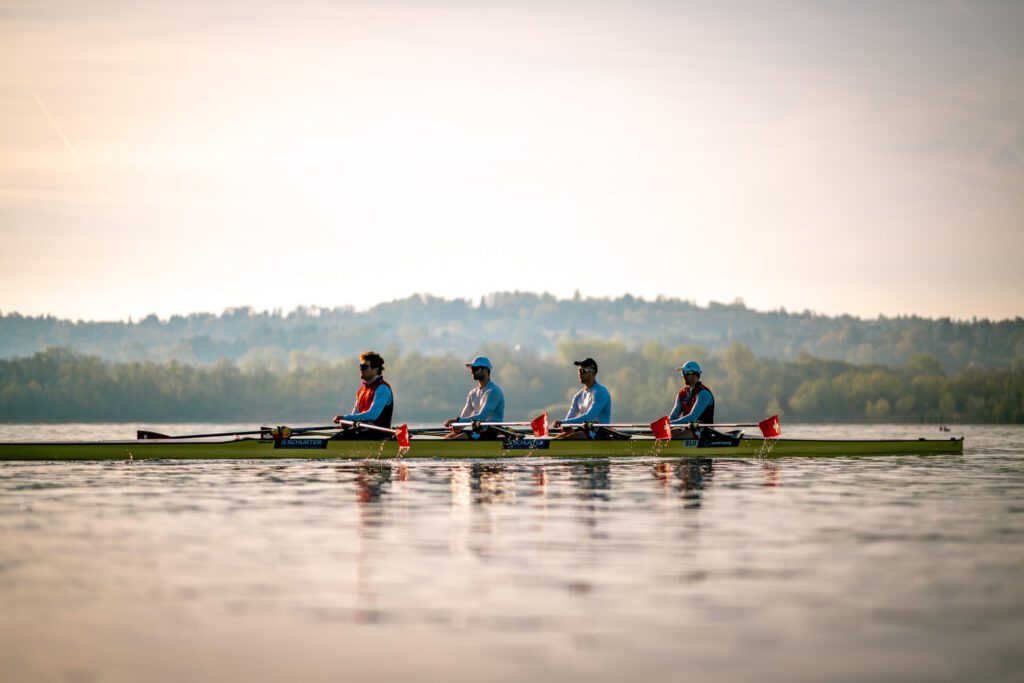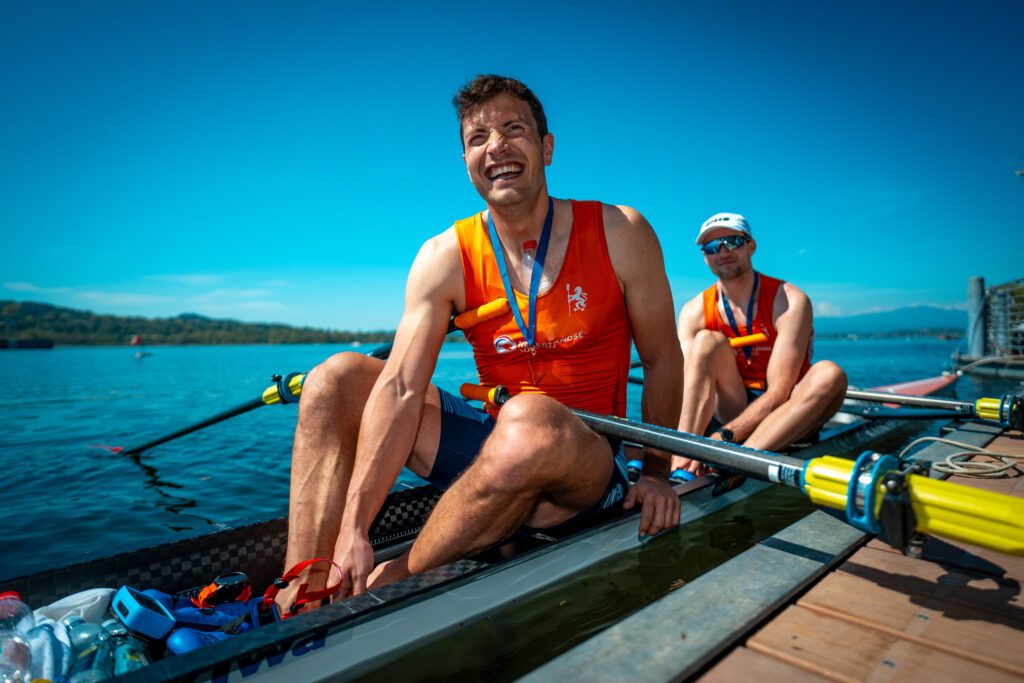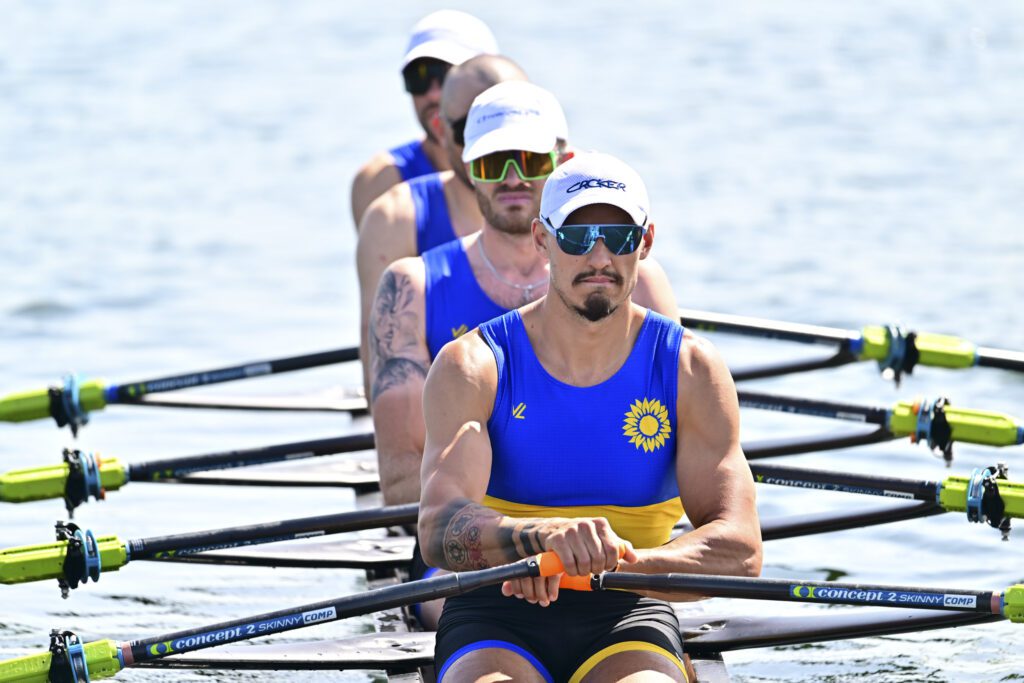Wednesday ended with a whimper after a bang: the re-rowing of the men’s pairs quarterfinal 2, after the Polish M2- had come a cropper and broken an oar against a broken-down umpire’s launch stuck in their lane. Yep, it doesn’t happen very often. We’ll address that particular elephant in the lake in a moment, but first to the less controversial action. The weather was much cooler than had been expected, and the FISA website was still hiccuping (which eventually prompted an apology from the MD of Delta Tre, FISA’s server and website providers), but supporters in Austria and abroad seemed to manage.
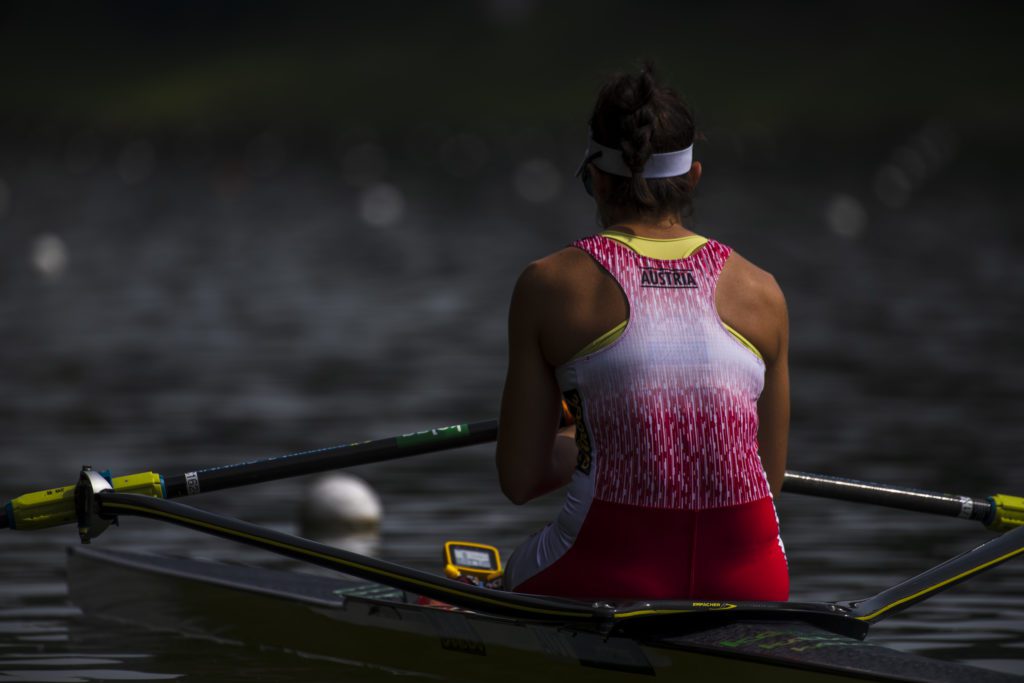
Photo Magdalena Lobnig // World Championships, Linz Ottensheim, Austria. Wednesday 28 August 2019
Credit Benedict Tufnell
The haze may have masked the sun but the fourth day of racing turned up the competitive heat another notch, as the big-entry events held their quarter-finals. Twenty-four crews racing in each, with only 12 staying on the medal/Japan pathway. Dozens had their hopes brutally dashed as the quarter-final guillotine came crashing down. Perhaps surprisingly very few top names missed the cut but there were some very sad fourth placed crews and the sight of German sculler Annekatrin Thiele being pushed into the C/D semis by Dutchwoman Laila Youssifou, who is in her first international regatta in the single, was a shock. The normally reliable Slovenian LM1x star Rajko Hrvat was off colour coming a disappointing fifth in the LM1x quarterfinal, while both Peter Galambos (HUN) and Martino Goretti (ITA) looked extremely comfortable.
See Worlds Day Four In Pictures
It’s hard to escape the probability that the New Zealanders are the quickest women’s pair this year: even when they’re trying to keep their feet off the pedal to save energy for the eight, they still manage to make the rest look slow. But in an Anglophone former Commonwealth clean sweep the Americans, Aussies and Canadians all won their semis and have enough speed to cause trouble at the weekend. Two of the women’s QFs were tight to the line between third and fourth, but even without the crash the men’s pairs QFs were exciting. Behind the as-usual victorious Sinkovics Belarus managed to dive past Turkey by a couple of feet and it was similarly tight between the British and Americans in the race the Kiwi pair won.
But for breathless racing you really need doubles, and they duly delivered. Three of the four LM2x quarterfinals had more than three crews still in contention as they wound up for the final sprint, and a lot of leading boats had to hold their nerve as the pack closed up. For the lightweight men’s medals you could parse any three from at least ten, and while the Chinese did seem quickest overall, the wind was occasionally picking up a tad which might account for it. A vocal Irish contingent roared their heads off first for Paul O’Donovan in their nation’s double and then for his brother Gary who qualified by the skin of his teeth and a photofinish in the LM1x races later. The lightweight women’s doubles were slightly more decorous and decisive, but the results hide quite a lot of gentle deceleration to the line, and again New Zealand couldn’t help themselves but be quickest despite letting South Africa close up toward their stern.
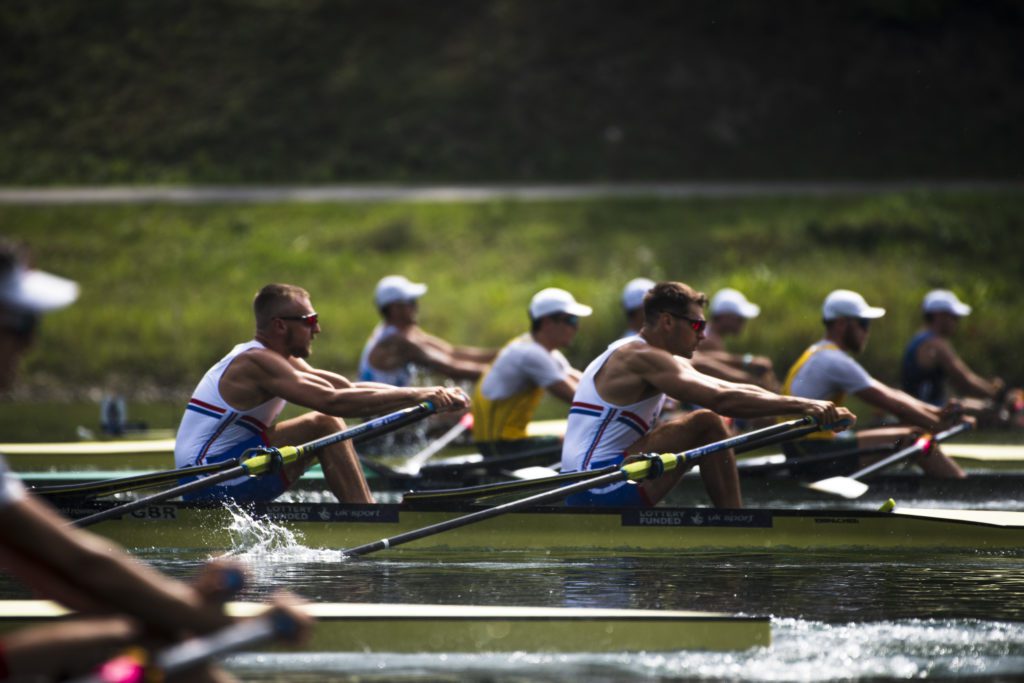
Photo The British won their QF despite suffering a late blitz attack from world cup winners Switzerland // World Championships, Linz Ottensheim, Austria. Wednesday 28 August 2019
Credit Benedict Tufnell
And then it was on to the men’s doubles and game-playing, some third-placed crews relaxing while the top two fought it out in the quest for good semi-final lanes. One of the former was Germany, whom I don’t believe are nearly as slow as they looked behind Ireland and Poland, while France definitely put their feet up while Lithuania hounded the Dutch ahead of them. China were easily the most rapid of the QF winners, leaving it to the Kiwis behind them to sneak past Romania, and the British won their QF despite suffering a late blitz attack from world cup winners Switzerland which forced the leaders to hoick up the rate to ensure they won.
The women’s singles still appear to foretell a final show-down between Kiwi Emma Twigg and reigning world champion, Ireland’s Sanita Puspure, but QF results have dictated that they must row a dress rehearsal on Friday which might change the bookies’ odds on the title. Pity poor Carling Zeeman (CAN) who will be vying with Austrian heroine Magdalena Lobnig for the last A-final place: the home-crowd support might just tip the balance in that match-up. The other quarterfinal winners were Brit Vicky Thornley and American Kara Kohler, both on form at just the right moment.
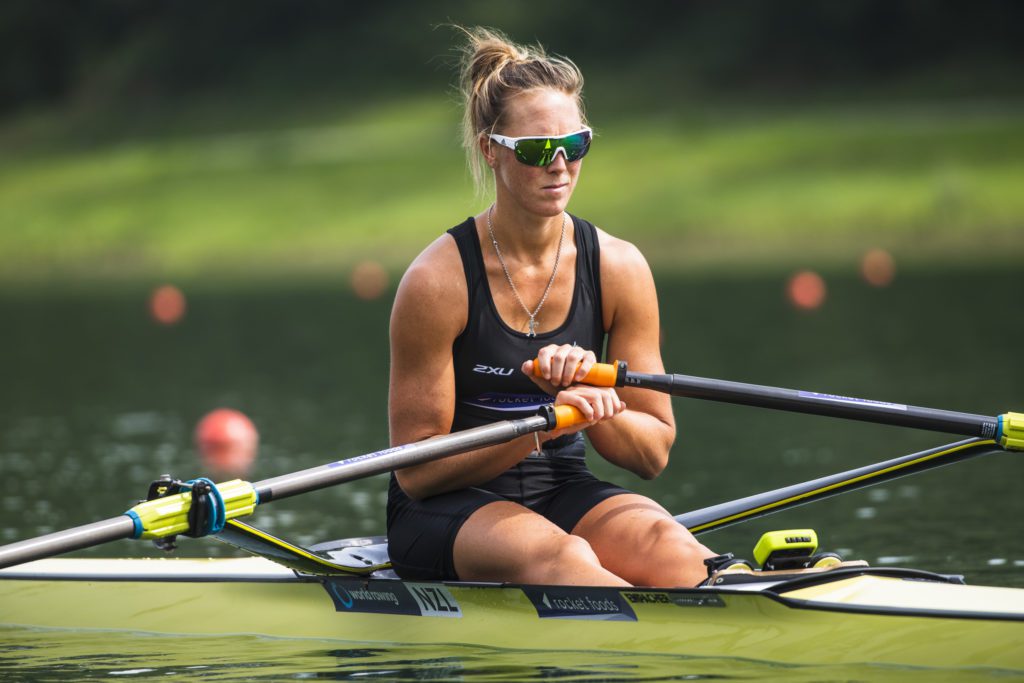
Photo Emma Twigg (NZL) // World Championships, Linz Ottensheim, Austria. Wednesday 28 August 2019
Credit Benedict Tufnell
After such a strong debut singles season it was sad to see Belarussia’s impressive Pilip Pavukou slip up and come fifth in the QF won by returning Dutchman Stef Broenink. In the same race Nico Stahlberg was bumped out near the line by Aleksander Aleksandrov, the Azerbaijani who seems to have at least one race-changing sprint per season inside him. Kjetil Borch (NOR) had a good mini-battle to the line against Robbie Manson (NZL) while behind the two of them Croatia’s Damir Martin lurked darkly, and will no doubt plan to take some scalps in the semifinal. Oliver Zeidler (GER) and Ondrej Synek (CZE) won the other two races, Synek looking strong but coming under severe pressure from Dane and 2019 leader Sverri Nielsen.
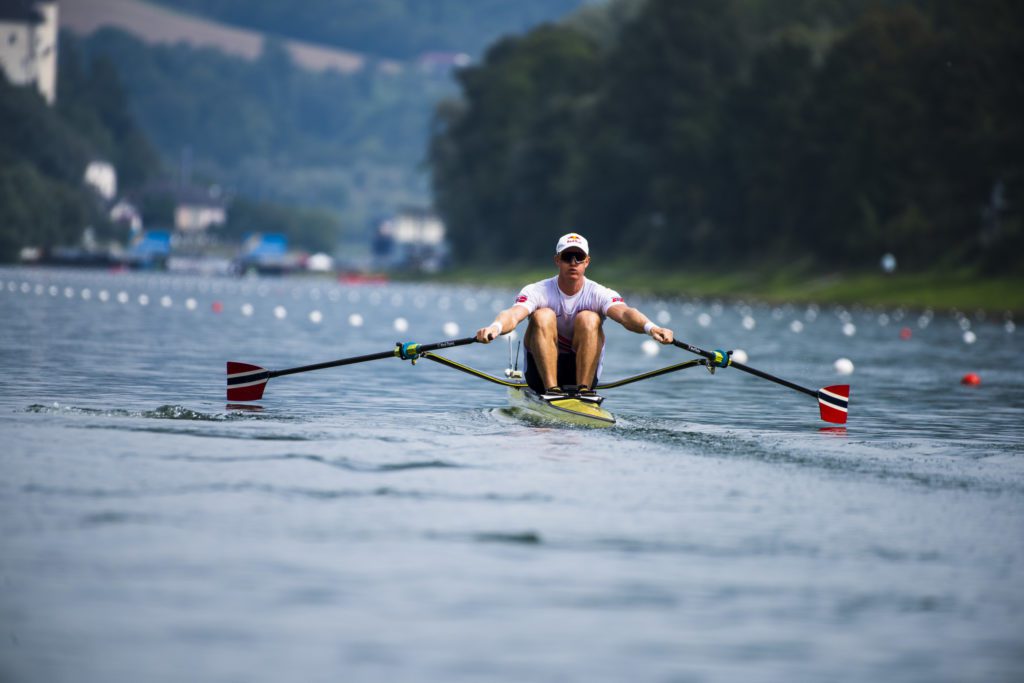
Photo Kjetil Borch (NOR) had a good mini-battle to the line against Robbie Manson (NZL) // World Championships, Linz Ottensheim, Austria. Wednesday 28 August 2019
Credit Benedict Tufnell
There were preliminary races for the non-Paralympic PR2 and PR3 straight-final categories, in which Annika van der Meer had her first loss of 2019, coming in second to the Australian and former Irish para-rower Kathryn Ross. The PR2 W1x winner from last year, Perle Bouge, is focusing solely on the mixed double this time, while the Dutchwoman is hoping to match her partner and that they will both manage the 1x/2x two-title sweep this season. Russia’s Alexey Chuvashev was the quickest PR1 M1x to win his repechage, and may cause trouble for the heat winners once we get to the semi-final.
Ok, time for elephants: what really happened in the pairs?
Early in the day, the second M2- quarterfinal result was withheld, and the race slated for an end of day re-row. The cause was an errant umpire’s launch, which had suffered engine trouble while trying to return to station after the first M2- quarterfinal had passed. Unable to get into the safety of lane zero before the next race, the launch inadvertently blocked the way for QF2 lane 1 occupants Poland, who promptly smashed into them and broke an oar. The overall outcome was that Poland couldn’t finish, and the umpires didn’t manage to stop the race. Cue lots of unhappy rowers. A re-row was ordered, the three winning crews objected but lost their appeal, and in the re-row Poland came fourth by more than a length clear water while the same three qualified.
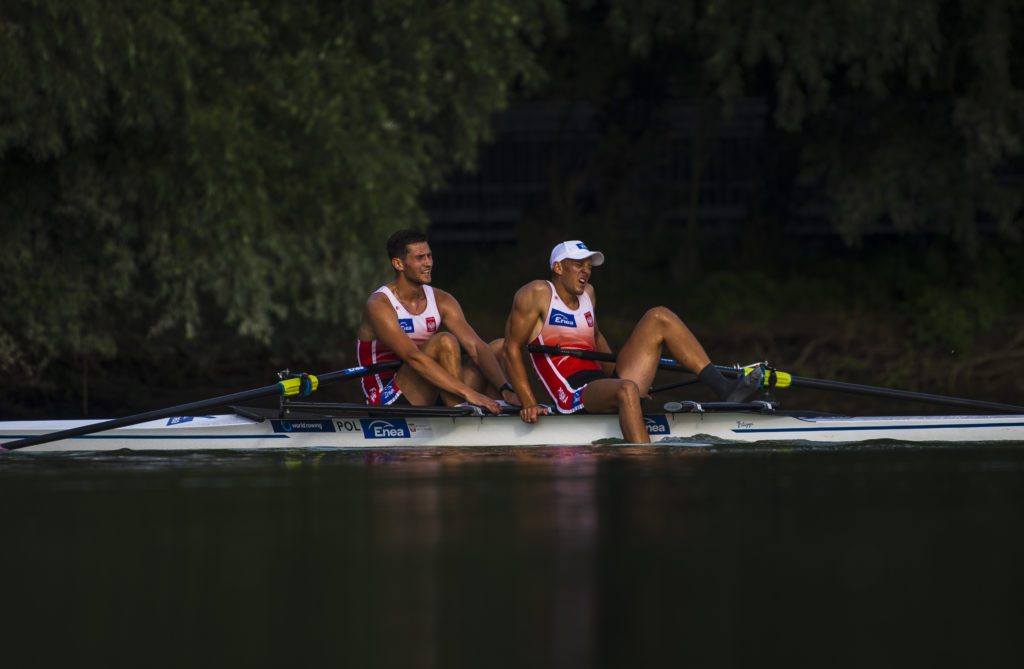
Photo After a re-row Poland came fourth by more than a length of clear water // World Championships, Linz Ottensheim, Austria. Wednesday 28 August 2019
Credit Benedict Tufnell
That’s the summary, now here’s the detail
The zonal or static umpiring works as follows: six umpires are stationed at approximately 150m (for early stoppages), 400m, 800m, 1100m, 1600m and 1800-1900m (to confirm clean races). They often alternate sides but in Linz only the first and fifth are on the non-grandstand side. The umpires pop out behind the crews into mid-course for virtually every race then glide back, although they are not usually allowed to move out behind the race until the last straggling crew has gone past. Like mobile umpires of former decades, they can steer crews off the buoys if needed, and to stop races they first ring their bells and then wave the red flag. It’s a cascading system: if one umpire can’t do what’s needed their duty cascades to the next. Once an umpire’s job is over they gently motor back to the side awaiting the next race.
The engine break-down happened to the fourth umpire, at about 1150m after they’d come into the middle to follow the first M2- quarterfinal. They did try to paddle the immobile launch back off the course, but couldn’t get out of the way fast enough, hence Poland — who were steering immaculately in their racing lane — hit them. With races running every six minutes and quite weak launch engines, Row360 gathers that having the 800m umpire move up quickly enough to catch the crews was not going to be possible. The 1100m umpire did alert the rest and then focused on keeping Poland safe, as they were unstable due to their broken oar.
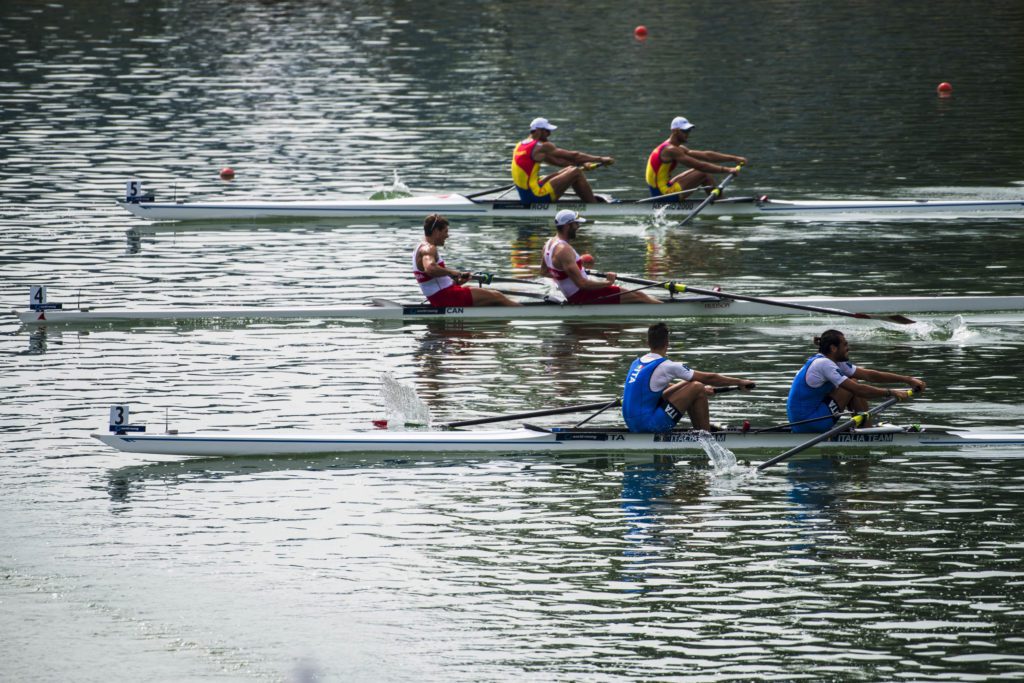
Photo The first running of the ill fated pairs QF: the fifth umpire on the far side of the lake did try to stop the racing crews but was ignored due to being too far away // World Championships, Linz Ottensheim, Austria. Wednesday 28 August 2019
Credit Benedict Tufnell
Meanwhile the fifth umpire on the far side of the lake did try to stop the racing crews but was ignored due to being too far away from the leaders and having to wait until backmarkers Chile in the adjacent lane had come past, some distance behind the main race. Chile did realise what had happened and stopped, but Italy, Canada, Romania and Denmark continued to row even when umpire six, on the grandstand side, moved into the middle to catch their attention after they had passed at about 1800m.
No athlete wants to go back to the wash-heavy days of mobile umpires so this problem will need to be tackled, and the cascade system might possibly be improved. In rules terms it was very clear: the option to have a seven-lane FISA race was discarded some time ago since it can cause quite a lot of problems and not all courses have more than eight lanes. The race was meant to be stopped, and did stop for two of the crews, neither of whom were at fault. So it had to be re-rowed in full — it was not possible under current rules to have just the three losing crews re-row, as the three winners had suggested via an appeal. Appeal turned down and full re-row confirmed. Unfortunately for Canada, who had finished second behind Italy in the first race, third-placed Romania liked the idea of a better SF lane, so mounted an all-out attack in the final few hundred metres and duly seized second, even if the same three boats qualified to the next round.
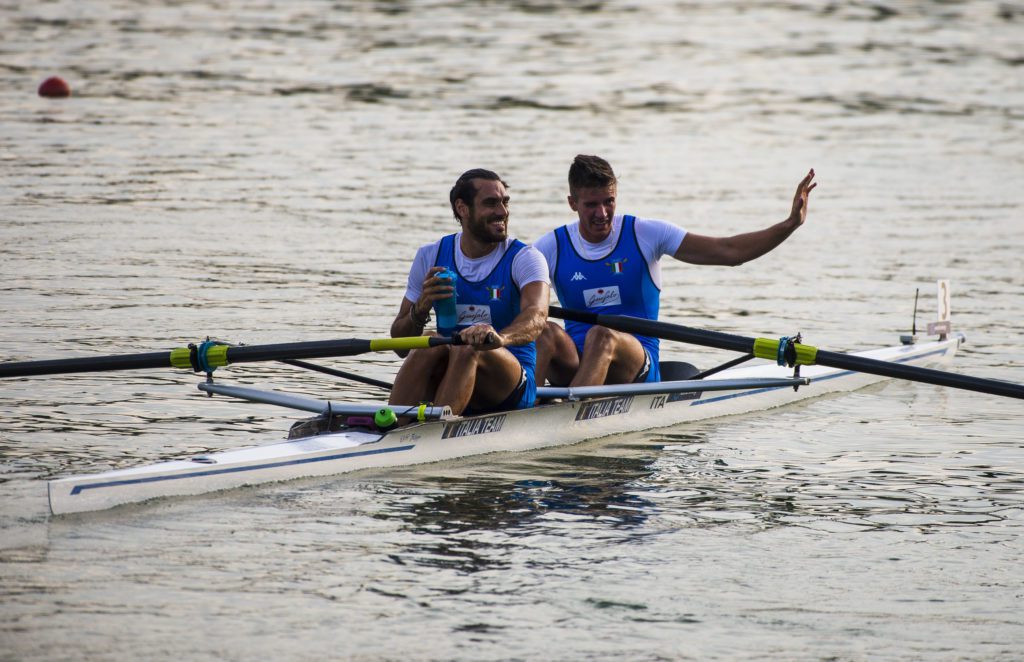
Photo All’s well that ends well for ITA who retained their first place finsih after the re-row // World Championships, Linz Ottensheim, Austria. Wednesday 28 August 2019
Credit Benedict Tufnell
The jury has, however, rescheduled all the semi-finals, which would have been held early on Thursday. The C/D semis (including Poland) will be raced at the start of Friday morning, and the A/B semis on Friday late morning before lunch. At least that way the re-row crews have as much recovery time as possible and everyone in Saturday’s finals will have exactly the same amount of time, including those vying for medals or the last five Olympic slots.
Let’s hope that’s the last oddity of 2019. World championships have a habit of throwing up new issues…

